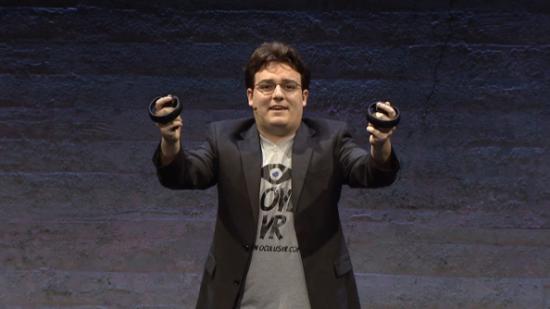There’s trouble at Palmer Luckey’s Oculus headquarters. A US district judge just ruled that Luckey’s former employer, Total Recall, may pursue a lawsuit against the Facebook-funded virtual reality company over claims he passed off the company’s confidential information as his own. While all that’s going on, Zenimax are also pursuing legal action, claiming that Oculus infringed Zenimax’s copyright and trademarks, using company secrets to develop their hardware.
Zenimax own Bethesda, who gave you Fallout 4 last year. We’ve made a friendly place for you to browse the best Fallout 4 mods.
Zenimax claim that the Oculus Rift has been built on their intellectual property since the earliest DK1 model, developed using funds from a hugely successful Kickstarter campaign and private investment.
The company’s court filing reveals that Oculus approached Zenimax in 2012 seeking help in the development of the Rift, and that Zenimax had invested ‘tens of millions of dollars’ in VR and immersive technology research for several years before Oculus.
Luckey’s company then benefitted from the involvement of John Carmack, claim Zenimax, at the time an employee of theirs before he and several of his key staff moved to Oculus VR in 2015. Carmack provided confidential research conducted by Zenimax to Oculus, claims the court filing.
That migration of Carmack and other employees is also a sore point for Zenimax. They claim it was a move to harness certain rights and expertise that were originally provided to Oculus under a non-disclosure agreement, and that Oculus would later fail to secure after the two parties couldn’t arrive at a price.
Zenimax released the following statement on the matter:
“All efforts by Zenimax to resolve this matter amicably have been unsuccessful. Luckey has held himself out to the public as the visionary developer of virtual reality technology, when in fact the key technology Luckey used to establish Oculus was developed by Zenimax.”
Meanwhile, Oculus also issued a statement which denies any validity in the claims:
“As we have previously said, Zenimax did not contribute to any Oculus technology. Oculus will defend these claims vigorously.”
With the Zenimax case ongoing, U.S. District Judge William Alsup in San Francisco has paved the way for Total Recall to seek compensation. As Reuters reports, he ruled on Saturday that “a breach of contract claim could proceed against Oculus founder Palmer Luckey.” More serious claims of fraud against Luckey were dropped, though.
